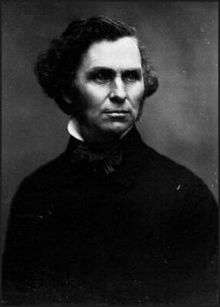Maine law

The Maine Law (or "Maine Liquor Law"), passed in 1851 in Maine, was one of the first statutory implementations of the developing temperance movement in the United States.
History
Temperance activist and mayor of Portland, Maine, Neal Dow helped craft this law. The passage of the law, which prohibited the sale of all alcoholic beverages except for "medicinal, mechanical or manufacturing purposes," quickly spread elsewhere, and by 1855 twelve states had joined Maine in total prohibition. These were known as "dry" states; states without prohibition laws were "wet."[1]
The act was unpopular with many working class people and immigrants. Opposition to the law turned violent in Portland, Maine on June 2, 1855 during an incident known as the Portland Rum Riot.[2] Opponents of the Maine Law stormed Portland City Hall because they thought Mayor Dow was keeping liquor in the basement.[2] Newspapers reported that Dow ordered rioters to be fired upon, killing one and wounding seven.[2] The riot was a contributing factor to the law being repealed in 1856.[1] However, despite repeal, prohibition was re-enacted in various forms and eventually was written into the state constitution in 1885.[2]
The Maine Law gained recognition internationally and was the inspiration for United Kingdom Alliance in Manchester, England. That organization grew and during the late 19th Century a street in Manchester, England was renamed "Maine Road" in honour of the law. Originally known as "Dog Kennel Lane", the street was renamed due to the influence of the Temperance Movement.[3] Between 1923-2003 Maine Road housed the stadium of the football club Manchester City F.C..[4]
Other States
- Delaware was the second state to pass a prohibitory liquor law in 1847 but one year later the State Supreme Court ruled that it was unconstitutional. In February 1855, a second prohibitory liquor law passed by the state legislature.[5]
- The Massachusetts legislature passed a "Maine Law" in 1852 which was struck down a year later by that state's Supreme Court. Two years later, in 1855, the legislature passed a revised prohibitory liquor law to avoid the constitutional flaws of the first law.[5]
- The Rhode Island General Assembly passed its own "Maine Law" in 1852, which outlawed sale or consumption of liquor for eleven years. Liquor was banned again in 1874 and 1886. When statewide prohibition finally ended in 1889, the decision was left to the individual cities and towns of Rhode Island whether to be "wet" or "dry".[6]
- Vermont's legislature also passed a prohibitory liquor law in 1852 which was ratified by the people of the state the year after.[5]
- Connecticut's legislature passed a prohibitory liquor law in 1853 but was vetoed by the governor. The next year, with a new governor, the legislature once again passed a "Maine Law" with a majority in both houses.[5]
- In 1853, Indiana passed a "Maine Law" which was invalidated by the state's supreme court. But in 1855, a new prohibitory liquor law was passed.[5]
- Also in 1853, Michigan passed a prohibitory liquor law which was ratified by 2/3 of the electorate. However, in 1854, the law was declared unconstitutional. The next year the state legislature passed a revised liquor law.[5]
- In 1854, the people of Texas voted to prohibit the sale of liquor in quantities less than one quart.[5]
- In 1854, Ohio passed a law "forbidding the sale of intoxicating liquor," which was ruled unconstitutional by state appellate courts. However, in 1855, the Ohio State Supreme Court overturned the lower court rulings and upheld the constitutionality of a statewide prohibitory liquor law.[5]
- The New York state legislature passed a prohibitory liquor law in 1854, only to be vetoed by Governor Seymour. The same year, Governor Seymour was replaced by the prohibition candidate Myron H. Clark. Early the next year, the legislature re-passed the "Maine Law," though it had spotty enforcement.[5]
- Pennsylvania's prohibitory liquor law went into effect in 1855 after its passage by the state legislature.[5]
- 1855, the Iowa state legislature passed a "Maine Law" which was ratified by the people the same year.[5]
- In 1855, the New Hampshire state Assembly overcame two previous rejections by the state Senate to pass a prohibitory liquor law.[5]
- In 1880, under the Governorship of John P. St. John, the State of Kansas enacted a liquor prohibition law.
See also
References
- Rolde, Neal (1990). Maine: A Narrative History. Gardiner, ME: Harpswell Press. p. 178. ISBN 0-88448-069-0.
- 1 2 Henry Stephen Clubb, The Maine Liquor Law: Its Origin, History, and Results, Including a Life of Hon. Neal Dow (Published by Pub. for the Maine Law Statistical Society, by Fowler and Wells, 1856) (accessed on Google Book Search on January 21, 2009)
- 1 2 3 4 Bouchard, Kelley (2 October 2011). "When Maine went dry". Portland Press Herald. Retrieved 4 January 2016.
- ↑ James, Gary (2009). The Big Book Of City. Halifax: James Ward. ISBN 978-0-9558127-2-9., pp 225-228
- ↑ James, Gary (2003). Farewell To Maine Road: The Official History of Manchester City's Grounds. Leicester: Polar Publishing. ISBN 1-899538-19-4.
- 1 2 3 4 5 6 7 8 9 10 11 12 Henry Stephen Clubb, The Maine Liquor Law: Its Origin, History, and Results, Including a Life of Hon. Neal Dow (Published by Pub. for the Maine Law Statistical Society, by Fowler and Wells, 1856) (accessed on Google Book Search on January 31, 2012); Volk, Kyle G. (2014). Moral Minorities and the Making of American Democracy. Oxford, UK: Oxford University Press. pp. 167–205. ISBN 019937192X.
- ↑ Carcieri, Paul T. (2007). "A history of temperance and prohibition in Rhode Island, 1820--1916" (Dissertation). ProQuest Dissertations. Providence College. Retrieved 7 February 2015.
Further reading
- Volk, Kyle G. (2014). Moral Minorities and the Making of American Democracy. Oxford, UK: Oxford University Press. pp. 167–205. ISBN 019937192X.